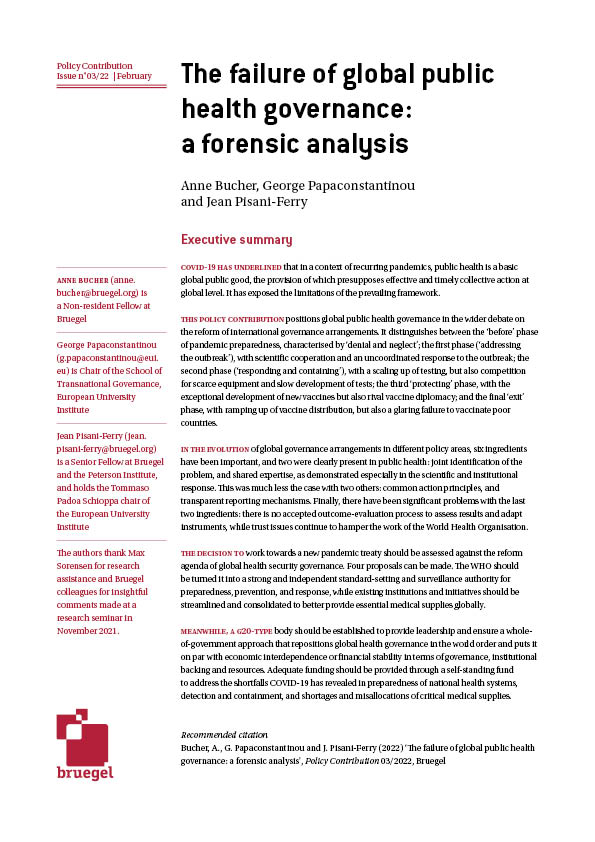Opinion
Without good governance, the EU borrowing mechanism to boost the recovery could fail
The European Union recovery fund could greatly increase the stability of the bloc and its monetary union. But the fund needs clearer objectives, sustainable growth criteria and close monitoring so that spending achieves its goals and is free of corruption. In finalising the fund, the EU should take the time to design a strong governance mechanism.
This opinion piece has previously been published in El Pais, Il Sole and Rezpospolita, LeMonde and FAZ.
In late July, the European Council created the European Union recovery fund, a major new policy instrument that could substantially increase the stability of the EU and its monetary union, and under which the bloc will for the first time borrow and pay out large sums as grants. But the Council deal lacks a clear strategy to ensure the money boosts inclusive, sustainable growth and avoids corruption. This gap must be plugged, because the recovery fund will be delegitimised if wasted. The ongoing negotiations between the European Parliament, the Commission and the Council (the trialogue) provide an opportunity for improvement and should focus on three crucial points.
First, the goal needs to be more clearly stated: providing a boost to Europe’s sustainable growth potential. The current focus on speedy disbursement suggests policymakers still hope the EU funds can play a countercyclical role, but this will not work. The Council wants to commit 70% of the main instrument, the recovery and resilience fund (RRF), in 2021-2022, but only a quarter of disbursements are planned for these two years. All EU countries can go to the markets to borrow and it is national budgets that can and should be used to support economies reeling under the immediate effects of the pandemic. EU funds, meanwhile, should be part of a medium-term strategy clearly focussed on quality spending. This will provide some protection against the permanent damage to Europe’s growth potential COVID-19 is likely to leave in its wake. The EU funds should thus be about medium-term growth objectives and not countercyclical fiscal policy.
The second question then is how to achieve quality spending that would boost sustainable growth. The European Council conclusions from July include some vague statements about linking EU funds to the European Semester, the EU’s annual process to steer member states towards inclusive and sustainable growth and digital transformation. But the European Semester has proven to be a rather ineffective bureaucratic process that EU countries too often disregard.
It is easy to see how such a bureaucratic process will trigger a bottom-up approach driven by special interests in EU countries. in which spending plans are labelled, as requested by the European Commission, “green, social and digital.” Plans will be sent to Brussels and result in large pay-outs with little benefits. While the design of the recovery fund, with its predominant focus on the RRF, puts national governments in charge, clear conditions are still crucial for sustainable growth goals to be achieved. A recent study proposes the use of recovery funds for major structural reforms, such as in the education system, public administration efficiency and climate goals. The new EU funding is a unique opportunity to provide the ‘carrot’ for genuine structural reforms.
Quality spending requires good governance. The third issue is therefore monitoring so that spending achieves its goals and is free of corruption. Unfortunately, EU funding has a mixed record of avoiding corruption. Meanwhile, academic work has confirmed that the vast amounts of common agricultural policy funds do not achieve Europe’s green goals despite repeated claims to the opposite. The current governance of EU funds can be regarded as unsuitable for achieving stated political goals.
The European Parliament rightly insists on a strong say. A better ‘red-card’ procedure to stop pay-outs in case money does not achieve the political ambitions is needed. The currently proposed process foresees the Commission asking for opinions from the Economic and Financial Committee, a group of top finance ministry officials, on whether political targets of the funds have been achieved. The committee shall strive for consensus but if one or more countries disagrees, the matter will be referred to the European Council. But state secretaries discussing a Commission report will not provide the accountability necessary for the EU’s biggest borrowing programme. Even members of the European Council will not challenge their peers unless there are blatant breaches of agreements.
Instead of intergovernmental debate, real political accountability is needed to avoid corruption and the failure to achieve the EU’s political ambitions of green and inclusive growth. This political accountability should also ensure that the interests of the EU as a whole are considered. The European Parliament should therefore insist on receiving regular and detailed reports from the Commission and should hold hearings with the involved Commissioner to bring about transparency and public accountability. Moreover, the Parliament should entrust the European Court of Auditors and the European corruption watchdog OLAF with constant monitoring of the spending.
Negotiators should take the time to design a strong governance mechanism. Europe cannot afford to waste its resources
Republishing and referencing
Bruegel considers itself a public good and takes no institutional standpoint.
Due to copyright agreements we ask that you kindly email request to republish opinions that have appeared in print to [email protected].
















